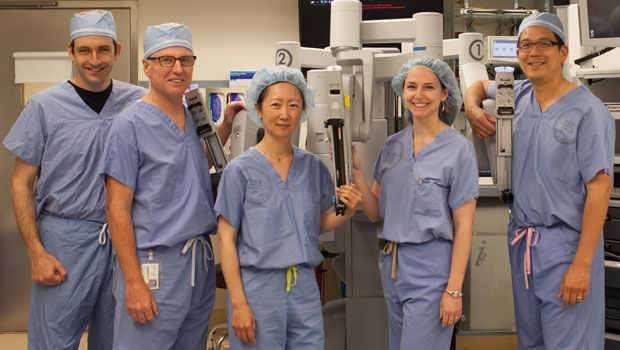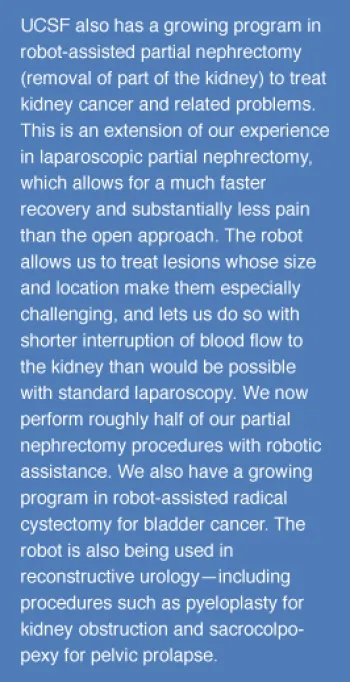Submitted on December 4, 2012

UCSF is the busiest center for robot-assisted urologic surgery in Northern California, performing all of our prostate cancer surgeries with the aid of this equipment. UCSF Urology has always been at the forefront of surgical innovation, and has focused on new technologies that add substantial value—not just novelty—to patient care. Robot-assisted surgery has played a growing role in our management of urologic malignancies since the early part of the last decade, as we have carefully tracked patient outcomes and compared robotic assistance to traditional open radical prostatectomy, in which the prostate gland and surrounding tissue are removed.
The da Vinci surgical system robot allows the surgeon to sit at a computer console and direct a camera and two to three laparoscopic “arms” that are introduced into the body through small incisions. The system also provides the surgeon with a highly magnified, three-dimensional visual field.
With the introduction of any new surgical technique, it is important to establish advantages and disadvantages compared to previous treatment options. A recent report by the Institute of Medicine on national priorities for future comparative effectiveness research highlighted robot-assisted surgery as among the top 100 areas for future investigation, with specific reference to robot-assisted versus open prostatectomy.

At this point, studies from many institutions have shown that robot-assisted prostatectomy is associated with less blood loss and a slightly more rapid convalescence than the open procedure. Short-term complications appear to be less common with the robot-assisted approach, and in terms of cancer cure, the preponderance of evidence suggests that the two approaches are equivalent. However, the relative impact of robot-assisted versus open surgery on long-term, health-related quality of life issues such as urinary and sexual function is less clear.
With any surgical procedure, the skill and experience of the provider and hospital, as well as the technology used, play an important role in patient outcomes. A large body of literature has shown that positive outcomes are correlated with the volume of procedures performed by a surgeon and facility.
At UCSF, we are committed to gathering outcomes data that will help us determine the relative value of all treatment options. Patients managed for prostate cancer at UCSF complete validated quality-of-life questionnaires before and after treatment, which allow us to track our outcomes with a high degree of precision.